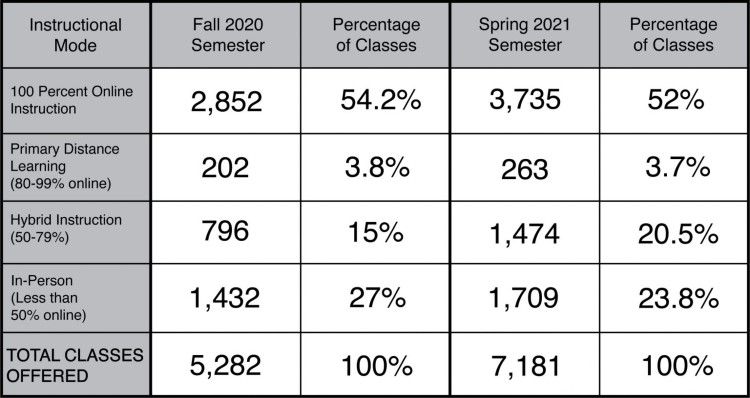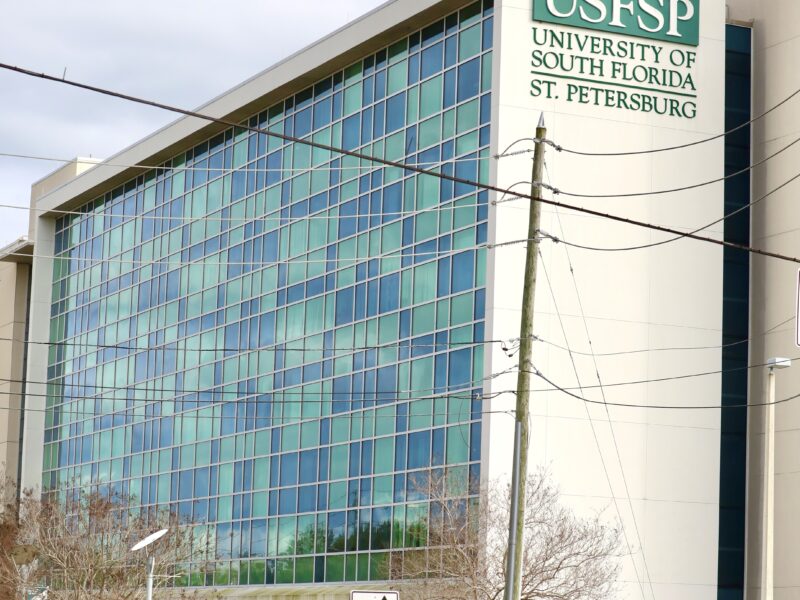Pictured Above: Though USF’s spring semester will offer an increased number of hybrid classes, the majority will remain online, with even lower percentages of in-person classes being offered.
Darnell Henderson | The Crow’s Nest
By Catherine Hicks and Annalise Anderson
Despite calls from students to increase in-person class offerings, the percentage of in-person classes is decreasing in the spring semester.
Spring registration opens Nov. 2 with the majority of classes remaining online. According to an email from the USF Office of the Registrar on Oct. 5, the university plans for a “comprehensive and robust class schedule” but will continue to provide “quality online options.”
“We are attempting to offer more in-person and hybrid classes in the spring semester,” said USF St. Petersburg Regional Chancellor Martin Tadlock. “We got feedback from students asking for more in-person (classes) so we’ve been trying to provide that.”
Despite this attempt, according to the schedule planner as of Oct. 9, the percentage of in-person classes being offered decreased from 27 percent in the fall to 23.8 percent in the spring.
Hybrid classes, which require a minimum of three hours of in-person instruction and are delivered 50 to 79 percent online, increased from 15 percent in the fall to 20.5 percent in the spring, and fully online classes decreased by two percent, but remained over 50 percent of the total class offerings.
In total, there are 7,181 classes being offered in the spring, compared to 5,282 in the fall. Most of these additional classes were added in the hybrid and online instructional mode.
On Oct. 5, USF announced the movement of spring break from March 15-21 to April 12-18, 2021. Following spring break, from April 16 to May 9, all classes will be delivered remotely.
Tadlock reminds students that health and safety remain a top priority and that the university continues to follow the advice of its health professionals.
The continuation of online classes spells potential defeat for students who have struggled to navigate their higher education learning during the pandemic. Although, some admit that they understand the university’s decision.
“(I’m) very disappointed. I was really looking forward to taking in-person classes for my harder class requirements, but it doesn’t seem like that will be the case,” said Annabelle Kozlowski, a dual major in political and environmental science. “I don’t blame USF for wanting to stay online, because I do think it’s the best decision.”
Cassidy Delbango, a marine biology sophomore, worries that the extended need for online classes will impact her academic standing.
“I’m not very happy about it, even though I understand why (USF made the decision),” Delbango said. “I feel like I haven’t learned anything this semester and my classes are getting harder in spring. My GPA is going to suffer a lot.”
Christine Gebhardt, an international studies and pre-law major, is grateful that she can continue to keep her high-risk family safe but concedes that she misses the sense of normalcy of in-person instruction.
“I was a bit disappointed going into schedule planner and seeing all my potential classes have that ‘all online 100%’ instructional mode next to it, but I get it,” Gebhardt said. “My parents are high risk, so at least I don’t have to worry about transmission from commuting to school, but I still wish I’d be able to have in-person classes.
“I miss (normality).”
Alexendra Davis, a mass communications senior, said she is “relatively happy” because online classes are better for her work schedule. However, she worries that this will prevent her from walking in her spring graduation.
A USF doctorate student studying curriculum and instruction wished to remain anonymous, but was one of three students in the USF Reddit that expressed a desire to take a leave of absence if they had to remain online.
“I’m extremely disappointed,” the student wrote. “I’ve been willing to deal with any restrictions/rules for in person attendance because the online experience has been horrendous, but we don’t even get a choice in the matter most of the time. I didn’t sign up for an online Ph.D., and by the end of the academic year, the majority of my second half of my coursework will have been online.
“My experience with online education has been extremely subpar, but with one semester to go I just have to deal with it. If I were earlier in my program, I would have taken a leave of absence until the option for in-person classes resumed.”
USF St. Petersburg has always offered a number of online majors for its students. Tadlock warns that there may be even more majors offered entirely online after the wrath of COVID-19 begins to subside.
His advice to students struggling with digital learning is to establish relationships with professors and classmates.
“My advice to students taking online classes, from someone who has both taught an online class and been a student of one, is to reach out to your professors,” Tadlock said. “There is another person, a professor and instructor, on the other side of the computer who is ready and able to help you.
“Build relationships with your professors and your classmates, because these connections, made online or in-person, will carry over after graduation into your careers.”
Since Aug. 7, USF has remained in phase two of its four phase reopening plan and has not announced that any changes will be made as it enters the spring semester.



